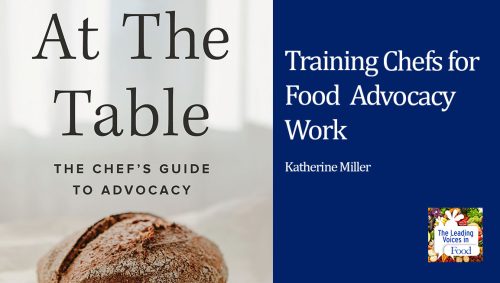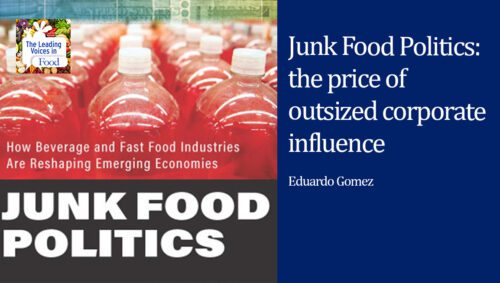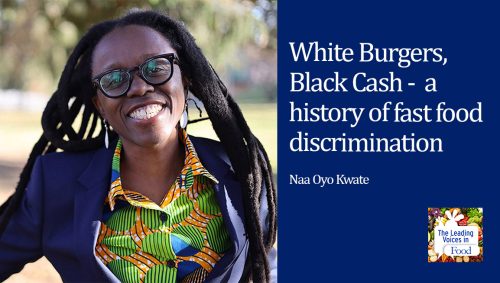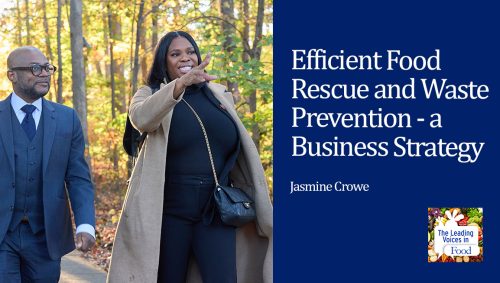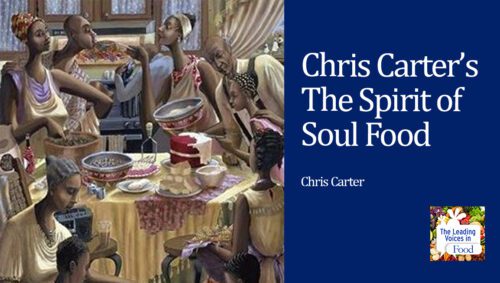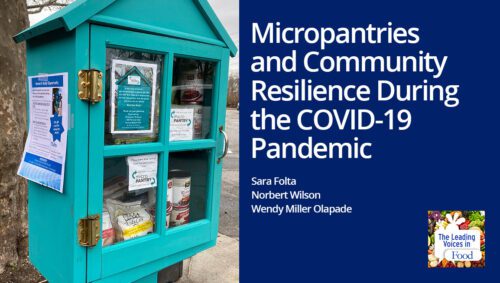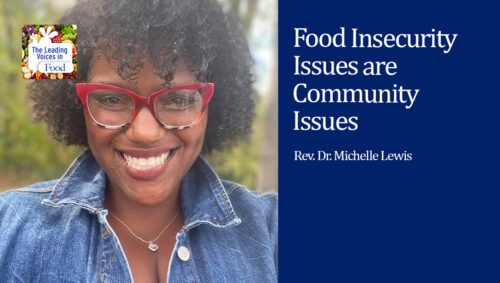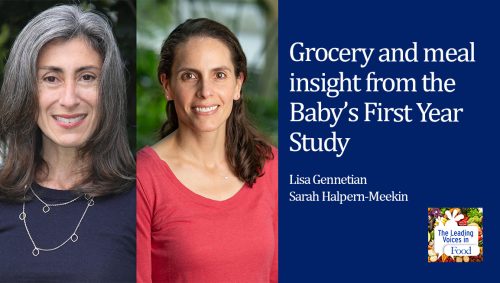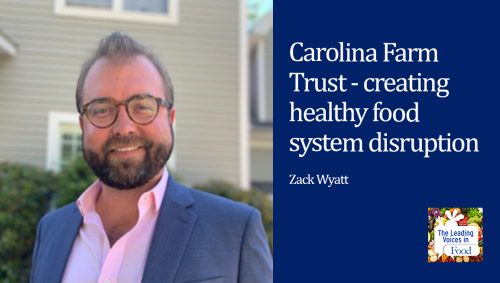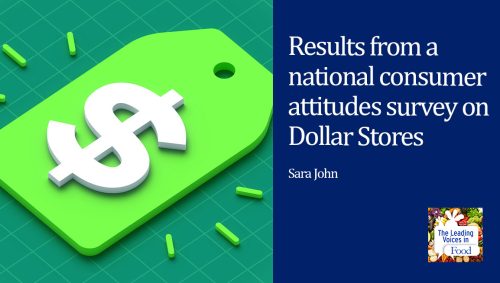The Leading Voices in Food
E25: Christopher Carter on Looking at Food Theologically
How should society balance people’s needs and wants for meat and eggs against the needs and wants of farmers and farm animals? What do theologians and ethicists have to say about factory farming, animals and marginalized communities. It’s a complicated subject that triggers strong feelings about moral economics, racial equity, nutrition, and environmental sustainability will explore these issues today on The Leading Voices in Food podcast with our guest, Methodist pastor Christopher Carter, who’s also an assistant professor of theology and religious studies at the University of San Diego.
Subscribe: Apple Podcasts | TuneIN | Google Podcasts | SoundCloud | PocketCasts | Radio Public
Tags: Advocacy & Food | Equity, Race & Food Justice | Faith & Food | Food Banks, Food Pantries & Soup Kitchens | Food Insecurity |

Pastor and Dr. Christopher Carter is an Assistant Professor of theology and religious studies at the University of San Diego. He has a background in theology, religion, and the study of ethics in society. He is the author of the book, The Future of Meat without animals and writes about the food system through the lens of oppressions experienced by people of color, the environment and animals.
Interview Summary
You’re a Faith in Food Fellow with Farm Forward, which is an organization dedicated to reducing factory farming and promoting the best of animal husbandry and sustainable family farming. Could you tell me more about your work on farm forward?
So the former executive director, but kind of the person who started it, Aaron Gross is a friend of mine and first encountered my work as a grad student several years ago. And he knew that I was kind of making connections between a farmed animal welfare, and race and farm workers in ways in which that he had not heard yet. And this was maybe in 2011 and 2012. So pretty early on in my academic research into this. And so he approached me many years later, and just kind of kept tabs on my work, and let me know that they had some finances. They were looking to invest in people who were really engaged in trying to address some of the systemic issues that you named earlier with regards to animal husbandry and animal welfare. I actually add to kind of farm worker element into it as well.
And so initially what they helped me do with funding was to fund my research. And so I did five weeks, in Louisiana, in basically what you might call Plantation Alley, and visiting different former plantations to do research on indigenous African agricultural practices. I wanted to learn about the knowledge base that former or that enslaved Africans brought here with regards to animal agriculture. So animal husbandry and agricultural technologies that they brought here, that were used on plantations and how those knowledges still exists in different parts of the South especially. And how we might, as African American Christians begin rethinking a or adopting those things in our current context as well. And so they helped pay for that because at this point I was still a grad student, so I was still poor.
So, after that, we maintained a relationship with regards to my outreach to local churches. And so they support me. I usually visit churches mostly in the spring and summer, so it is kind of offset my liturgical calendar, I guess, if you will, because you have Advent and other religious seasons that keep me tied to my local congregation. Spring and summer is when I’m able to actually visit other congregations to help them, as I say, start thinking theologically about food. So part of my responsibilities is just engagement with local churches specifically charging or looking at ethnic minority churches, but just broadly understood in the Methodist circle. Most of the churches tend to be predominantly White as well. And so helping them make the connection between their theological beliefs, our theological beliefs, I guess I should say, how we treat creation and how we treat and how we think about what we eat right.
And how these things are interconnected perhaps in ways in which they hadn’t unpacked, right? I even start with things like grace, you know, and we think about food and a religious perspective. We pray over this food, but what does that really mean when we do that and what are some of the questions and things that we’re saying? Whereas some of the assumptions we actually have when we say grace. And let’s begin to name those things, to bring that kind of a certain level of consciousness to it. And then ask ourselves, are the ways we are acquiring this food is it consistent with the ways in which we even say grace, right? Is it really consistent with the theologies that we claim to uphold? And often after some questioning and deep soul searching they find that, well, maybe it’s not quite as consistent as we want it to be.
And so then helping them think through what are the next steps, right? What they might do to begin to make some changes with regards to where they buy their produce, what they use, what they serve, all these other kinds of things.
When you say you’re helping churches think theologically about food, you gave a couple examples about saying grace procurement, but can you help our listeners understand what does that look like practically? How do you think theologically about food?
Thank you. That’s a great question. I think first and foremost, I guess I probably need to step back a little bit and say that I come at it from my own personal experience and then I try to make that accessible to others. And so personally I grew up in a very food insecure household.
And so for me, thinking theologically about food, first and foremost starts with grace because it starts about being thankful to have something to eat. And so I begin with this premise of the creation narratives. And I look at those narratives as poetry and say what would it be like to imagine a space or all people, people have access to these kinds of opportunities in this, this blessing that from this poem that we can learn, that is a beautiful vision of what the world could be. And so first and foremost I encourage people to imagine and engage. To imagine what the world could be if this kind of a literature actually existed, but then to begin to do that kind of inner deeper work about what it is that we’re actually doing in local congregations.
So specifically, the ways in which I go about doing that first is helping them first to kind of map out their own assumptions around food and around eating. Who cooks? Where they get their food from? What do they eat? And then having them think more critically, once they begin to examine some of the ethical dimensions of where they get those things, and I say who cooks because that’s a way to get at questions of gender and power. Quite honestly, you know.
How does play out. Could you give an example to help someone think more theologically?
Oh yes, I can. So I’ll give you an example of what I did in my own congregation first. And what I did is, as a senior pastor at a black church, I never ate first. I always ate last and I always help prepare and serve the food. And I do this rooted out of Jesus’s parable of washing disciples’ feet and talk about our role as clergy to model service. And what that looks like. And then frame it around food as one primary means by which we actually can serve others, literally serve them food. But also help people who, especially the church I worked at–this was in Compton, California, we’re in a very poor city with a lot of homeless and we had several unsheltered people come to our church, especially on first Sundays where we had potlucks. And they knew that and they were welcome. And so first and foremost, you have to, I would argue, you do have to model it in order to get people to be able to see that you, as the leader of this space, take this seriously. And you’re trying to set a tone for creating a welcoming and inclusive space and environment. And that can be done through plates. The second way, I guess I would say, I help people think theologically about food. I did want to say this–real things I forgot earlier is through stories and having people.
I always like to use the example of our, our bowls are griots and griots are in the West. African traditions are storytellers. And so what we serve tells a story. Often a story that is passed down from our grandmothers or mothers or fathers or whoever was the cook. There’s something there that says something about us. And so when we serve food at church, what story does it tell you? Does it feel something’s been missing from that story? I think if we are people of faith, if we were supposed to be about compassion and justice, I don’t know that our food shares that story, right? That we serve if we haven’t thought theologically about where that food comes from. Who’s growing it? And who may or may not be suffering as a consequence of it. And so if we want to model that and share it, it’s not just a saying. It’s not so much to make sure that you acquire food from good suppliers to feel good about yourself. Right? It’s really about actually naming that. So the people who are eating know that you’ve thought about these things. Most, especially if you’re in a predominantly African American church, our ancestors come from agriculture. So you know, you’re maybe a generation or two removed from people who are farmers and they can relate to that. My experience is they respect that and they honor that and there’s a meaning there. And so helping them reconnect with those stories of their childhood. Modeling that particular kind of service, helping them understand that our bowls and plates tell a story about who we are and who we want to be in the communities that we belong to be a part of. I think this is essential into the first steps of getting people to think theologically about food.
When you’re trying to get people to consider these elements of maybe animal welfare, the welfare of the laborers, where the food comes from, all of these critical questions, what are some of the challenges you’ve encountered? Trying to get people to think theologically about food.
So I would say the strongest challenges are from churches who tend to have more of an inward focus. And one could say that’s most churches. Inward focused, meaning that they are focused on preservation. Self-preservation rather than any kind of ministry that’s really directed towards a kind of solidarity for the community.
Is that focus around sufficient funding to keep the church running?
Yes. Often focused around sufficient funding. Operating out of a kind of a scarcity mindset that we have to do things to keep things open for us. And so you meet, I’ve met resistance by saying, well, this sounds great, but what you’re asking us to do is going to cost more money if we buy food the way you’re talking about. And if we do this, you know, we don’t have the budget line item to do this kinds of work. We’re more concerned about other things in the community. This seems as though it’s not important enough because it’s just about food and it’s just about animals, right? That’s been the pushback that I would get. The primary, strongest push back I get.
When you look at those places where it’s not where you would like it to go in terms of a theological underpinning around food, what does it look like and where are you trying to take it?
I would say what it looks like when people haven’t thought theologically about food and just have their plate there–it’s usually food that not locally sourced and it’s animal products that come from a factory farm in ways in which their food not only harms the environment, that only harms the animal, but that harms people.
And this is where I’m able to, I find that’s the space that I’m able to get people to begin to see the importance of changing. I think the dimension of farm workers and factory farm workers is obscured by the ways in which we buy groceries. And so people don’t see the ways in which people might suffer because of where you get your food from or how you get it. So helping them be able to share those stories with them is, is I would say, one of the crucial ways to get people to think that perhaps there are ways we can change our plates. And I will say to a certain degree there has to be a health dimension there as well, with regards to looking at a plate that they haven’t thought theologically about food, right?
Where they aren’t concerned. You know, it’s funny because Paul, the Apostle, has lots of things that are a one might find, I won’t say problematic, but somewhat troubling when it comes to society. But if you look at his letters as pastoral as they are, and if you recognize, I think, that at most I would say some of the interpreters are routed around what is it take for communities to flourish. And so he talks about the importance of being healthy so that he can do his job, this vocation. And so some of that language is the language that I use to congregations, for them to think about health and wellness. Not only as kind of superficial, such as I want to look a certain kind of way, but it’s I want to feel good so I can do my vocation to the best of my ability. So I can be the person that God has called me to be. That I can actually do the work that I feel as though I’m called to do. And so trying to make those connections, I think. I would too, for large part, would say my work is about interconnection. It really is helping people see how these things are much more interconnected than they think. Because again, as I said earlier, our current model of food procurement just disconnects people in such ways that they just don’t have to think about it
Delving a little deeper into your current work, you’re finishing up a book about African American Christians and food justice. Could you tell us a little bit more about that book? What are its primary arguments and what’s the contribution you want to make?
Yeah. So the book is entitled Spirit of Soul Food. It is at University Illinois Press. The essential argument there, and that was a part of the research that actually that Farm Forward was funding for me to do this research, I should say in Louisiana. I’m arguing for African American Christians to think theologically about food and creating ways for us to do that that are explicitly grounded in the black experience. Particularly leveraging the framework and language around soul that I think is really embedded in Black culture and soul food. And so what I try to accomplish, I call it a decolonial kind of liberative theology where I kind of try to decolonize the plate, so that we take seriously the ways in which White theological values have been adopted in African American church spaces that have limit food imaginations.
What does it look like? Those differences between the white theology around what’s on your plate versus the black theology?
Yeah, thank you. I think that probably the primary difference I would say is I want us to think about the racialized dimensions that exists with–so it’s not only how we get our food, we talked about that, so recognizing that those foreign workers are mostly black and brown is right. It’s recognizing that the factory farm workers are mostly black and brown. It’s recognizing that the people who live in these factory farm communities are black and brown. All the negative stuff about farming, industrial agriculture affects black and brown people more so than other communities. Globally it actually affects women more so than other communities. And so it’s helping them see that and see this as an issue that’s distinctly tied to the wellbeing of the black community in America. And writ large. So that’s one piece. The second piece is the reason I was doing the research in Louisiana is to recapture some of the knowledge that was lost.
I shouldn’t say lost. A knowledge that many contemporary black people don’t know that’s a part of our culture. So I used to volunteer at this kind of urban-like garden that my little brother at his high school they used to grow food. And there was one, a couple of students, but one student in particular that came up to me that I was trying to get to volunteer for the Garden Club. And I told him what we were doing and he said to me, you know, I don’t want to do that. What are you trying to do? Make me a slave? That was the language that he used about gardening. And it helped me. It awakened me to the fact that the consequences of forced agricultural labor psychologically and emotionally run deep rank.
And so a part of my research, and going to the plantations and doing research on indigenous African agricultural practices, is for people to know that the knowledge–there was a reason why they enslaved certain black tribes and not others. It is because they brought a particular kind of knowledge and skill set that is still used. So the ways in which rice was grown in the Carolinas come from Senegambia. Like it’s distinctly African as in the ways in which they still grow it over there right now. Different tribes, the Fulani for instance, are ones that were captured and brought to Texas and Oklahoma because of their particular experience in pastoral and animal husbandry. And so there’s all this knowledge that that is in black culture, African culture. We have been often, as black people, are told that we came here and we weren’t smart enough to know how to do any of this stuff.
And so the plantation owner, you know, out of their gracious goodwill showed us how to grow food because we didn’t know. And so I’m trying to undermine that assumption. So these people can be empowered to say, no, this is a part of our history and part of our culture and part of our past. We are an agricultural people. We are people from the land. And so I attempt to reclaim that through the language of soul and soul food, right? And redefine soul food and soulful eating in ways that not only challenge, I would say, decenter whiteness, right? Challenge the assumptions around farming and gardening. But center on the experience of black farmers and black gardeners and black cooks to show that there is this knowledge base that’s distinctly–that we have a distinct contribution to make. And that I would argue is also embedded within a lot of Christian language just because that’s as much as African Americans have been here.
And so ultimately I think that’s kind of my aim in the book by trying to describe what soulful eating will look like and what gardening will look like. All these different kinds of practices I think that African American churches can engage in as they begin this journey of thinking theologically about food.
It’s so exciting to hear your message of reclamation of this pride within the African American community around farming and food. You’re here at Duke University and you are going to facilitate a large meeting around food and faith here. What makes this event unique? What do we want to get out of it?
I’m here as a facilitator who was graciously invited to help design the process, designed to get people to be able to connect with each other, to not only share what their expertise is but also to plan and think about what we might do after we leave this space. Right? It can’t just be a meeting where people come together and give each other hugs and feel good about what we do and then leave and go do nothing. Although there is a space for giving each other hugs.
What excites me about this event is that it has academics and practitioners and farmers. Like there’s a diverse group of people here committed to changing the structure of our food communities and food systems in America. And I think the potential for the cross pollination of ideas is exciting in this space. And so I’m really happy to be able to help do what I can to kind of create this space for that cross pollination of ideas to take root. So that we can begin to move forward and, and kind of change to the world with regards to how we source and eat our food.


